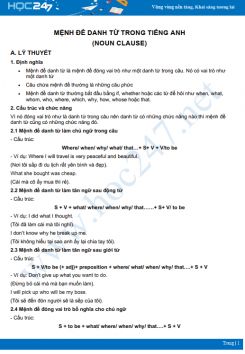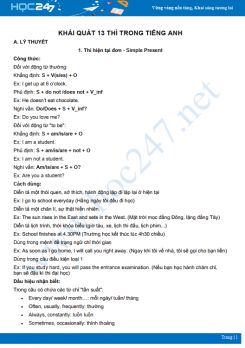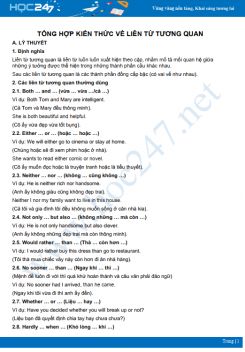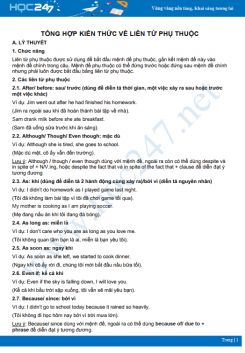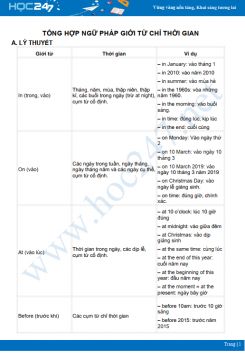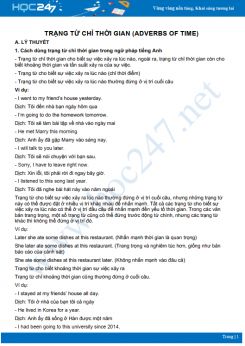Tài liệu So sánh Simple Present Tense và Present Continuous Tense được HOC247 biên tập và tổng hợp và giới thiệu đến các em học sinh lớp 10, với phần lý thuyết so sánh thì HTĐ và thì HTTD và bài tập vận dụng kèm đáp án, lời giải chi tiết giúp các em rèn luyện ôn tập chuẩn bị cho các kì thi sắp tới. Hi vọng tài liệu này sẽ có ích cho các em, chúc các em có kết quả học tập tốt!
SO SÁNH THÌ HIỆN TẠI ĐƠN VÀ THÌ HIỆN TẠI TIẾP DIỄN
A. LÝ THUYẾT
I . Về cấu trúc thì hiện tại đơn và hiện tại tiếp diễn
Cấu trúc của hai thì đều có 3 thể chính là thể khẳng định, phủ định và nghi vấn.
1.Thì hiện tại đơn
Khẳng định: S + V(s/es)
Ví dụ:
He plays tennis
(Anh ấy chơi tennis)
Phủ định: S + do not/ does not + V-inf
Ví dụ:
She doesn't play tennis.
(Cô ấy không chơi tennis)
Nghi vấn: Do/Does + S + V-inf?
Trả lời:
Yes, S do/ Yes, S does
No, S doesn’t/ No, S doesn’t.
Ví dụ:
Do you play tennis?
(Bạn có chơi tennis không?)
No, I don’t
Không, tôi không chơi
2. Thì hiện tại tiếp diễn
Khẳng định: S + am/ is/ are + V-ing
Ví dụ:
The children are playing football now.
(Bây giờ bọn trẻ đang chơi bóng đá)
Phủ định: S + am/ is/ are + not + Ving
Ví dụ:
The children are not playing football now
(Bây giờ bọn trẻ không chơi bóng đá)
Nghi vấn: Am/ Is/ Are + S + Ving?
Trả lời:
Yes, S am/is/are
No,S am/is/are + not
Ví dụ:
Are the children playing football now?
(Bây giờ bọn trẻ có đang chơi bóng đá không?)
Yes, they are
(Vâng, bọn trẻ đang chơi)
II. Cách sử dụng thì hiện tại đơn và thì hiện tại tiếp diễn
Ta thấy hiện tại đơn thường dùng để chỉ những tập quán, thói quen, chân lý, sự kiện còn hiện tại tiếp diễn thường dùng để chỉ những hành động đang diễn tiến lúc này.
1. Khi dùng với động từ có tính liên tục
Hiện tại đơn: diễn tả hành động lâu dài
They live in Tokyo.
(Họ sống ở Tokyo)
Có nghĩa là họ định cư và sinh sống ở Tokyo.
Hiện tại tiếp diễn: Diễn tả hành động ngắn ngủi.
They are living in Tokyo.
(Họ đang sống ở Tokyo)
Câu này ta hiểu rằng họ đang sống ở Tokyo có nghĩa là họ có thể chỉ đi du lịch và sống ở đó một thời gian ngắn.
2. Khi diễn tả một hành vi, sự việc nào đó ở hiện tại
Hiện tại đơn: Diễn tả hành vi thông thường và trùng lặp, nhấn mạnh sự thật.
The foreign girl studies Chinese at the university.
(Cô gái nước ngoài học tiếng Hoa tại đại học)
Trường hợp này dùng thì hiện tại đơn để nhấn mạnh việc cô gái học tiếng Hoa.
Hiện tại tiếp diễn: Diễn tả hành vi xảy ra tại thời điểm người nói, hành động chưa hoàn thành, nhấn mạnh tính hiện tại.
The foreign girl is studying Chinese at the university
(Cô gái nước ngoài đang học tiếng Hoa tại đại học)
Trường hợp này dùng hiện tại tiếp diễn để nhấn mạnh sự việc khi đang nói.
3. Động từ có tính tạm thời
Hiện tại đơn: Diễn tả tính tạm thời của hành động
The bus stops
(Xe buýt ngừng)
Trường hợp này có ý là xe buýt tự dưng dừng lại chắc phía trước có tai nạn, và việc dừng xe chỉ mang tính chất tạm thời, khi sự việc giải quyết xong thì xe lại đi như bình thường.
Hiện tại tiếp diễn: Diễn tả tính liên tục của hành động
The bus is stopping
(Xe buýt đang dừng)
Trường hợp này ta thấy xe buýt đang từ từ dừng lại, có thể xe đang chuẩn bị đi vào trạm.
4. Ngoài ra hai thì còn có những cách dùng khác như
Về thì hiện tại đơn:
Diễn tả một thói quen, một hành động xảy ra thường xuyên lặp đi lặp lại ở hiện tại.
He watches TV every night.
(Anh ấy xem TV mỗi tối)
Diễn tả một chân lý, một sự thật hiển nhiên.
The sun rises in the East.
(Mặt trời mọc ở hướng Đông)
Diễn tả một lịch trình có sẵn, thời khóa biểu, chương trình.
The plane leaves for London at 12.30pm.
(Máy bay sẽ rời khỏi London lúc 12 giờ 30 tối)
Dùng sau các cụm từ chỉ thời gian when, as soon as và câu điều kiện loại 1.
We will not believe you unless we see it ourselves.
(Chúng tôi sẽ không tin bạn trừ khi chúng tôi nhìn thấy nó)
Về thì hiện tại tiếp diễn:
Diễn tả một hành động đang xảy ra tại hiện tại.
The children are playing football now.
(Bây giờ bọn trẻ đang chơi bóng đá)
Dùng theo sau câu đề nghị, mệnh lệnh.
Look! The child is crying.
(Nhìn kìa! Một đứa trẻ đang khóc)
Thì này còn được dùng để diễn tả một hành động sắp xảy ra.
He is coming tomorrow.
(Anh ấy sẽ đến vào ngày mai)
III. Dấu hiệu nhận biết
1. Hiện tại đơn
Thường xuất hiện các trạng từ chỉ mức độ thường xuyên
- Often: Thường
- usually: Thông thường
- frequently – Always: Thường xuyên - luôn luôn
- constantly – Sometimes: Liên tục - đôi khi
- occasionally – Seldom : Thỉnh thoảng - hiếm khi
- rarely – Every day/ week/ month…: Hiếm khi- mỗi ngày/tuần/tháng...
2. Hiện tại tiếp diễn
- Now : Hiện nay
- Right now : Ngay bây giờ
- At the moment : Hiện tại
- At present : Hiện tại
- Look! Listen!...: Nhìn! Nghe!...
IV. Chính tả
1. Hiện tại đơn
Nếu chủ ngữ là ngôi 3 số ít (he, she, it, tên riêng…) ta sẽ thêm s để hình thành ngôi 3 số ít của hầu hết các động từ. Nhưng ta thêm es khi động từ có tận cùng là o, sh, s, ch, x, z.
He teaches French.
(Anh ấy dạy tiếng Pháp)
He goes to school every day
(Anh ấy đến trường mỗi ngày)
Nếu động từ tận cùng là y và đứng trước nó là một phụ âm, thì ta đổi y thành i trước khi thêm es.
He tries to help her.
(Anh ấy cố gắng giúp đỡ cô ấy)
She studies at China.
(Cô ấy học ở Trung Quốc)
2. Hiện tại tiếp diễn
Thông thường ta chỉ cần cộng thêm -ing vào sau động từ. Nhưng có một số chú ý như sau:
Với động từ tận cùng là một chữ e
Ta bỏ e rồi thêm -ing.
write – writing
type – typing
come – coming
Tận cùng là hai chữ e ta không bỏ e mà vẫn thêm -ing bình thường.
see- seeing
agree- agreeing
Với động từ có một âm tiết, tận cùng là một phụ âm, trước là một nguyên âm
Ta nhân đôi phụ âm cuối rồi thêm -ing
stop – stopping
get – getting
put – putting
Nếu trước phụ âm đứng cuối và trước nó là một nguyên âm dài, thì phụ âm cuối không được nhân đôi
Sleep- sleeping
Động từ kết thúc bởi các phụ âm như b; d; g; l; m; n; p; r; t, thì những phụ âm cuối được nhân đôi khi thêm –ing.
grab - grabbing
Slim- slimming
Grin- grinning
Spip- spiping
Prefer- preferring
Các động từ kết thúc với phụ âm đôi không cần phải nhân đôi phụ âm
pack - packing
climb - climbing
Các động từ có 2 âm tiết trở lên và kết thúc bởi âm tiết không đánh trọng âm cũng không cần nhân đôi phụ âm
visit - visiting
offer - offering
Lưu ý: Travel là một trường hợp ngoại lệ, nó có thể nhân đôi phụ âm "l" hoặc không nhân đôi khi thêm -ing,
Các động từ kết thúc bởi -c chuyển sang -ck trước khi thêm -ing hoặc các đuôi khác
Panic - panicking .
Với động từ tận cùng là ie
Ta đổi ie thành y rồi thêm -ing
lie – lying
die – dying
B. VÍ DỤ
Bài tập phân biệt hiện tại đơn, hiện tại tiếp diễn
Chia động từ đúng trong ngoặc:
1. Look! He (leave) the house.
2. Quiet please! I (write) a test.
3. She usually (walk) to school.
4. But look! Today she (go) by bike.
5. Every Sunday we (go) to see my grandparents.
6. He often (go) to the cinema.
7. We (play) Monopoly at the moment.
8. The child seldom (cry) .
9. I (not/ do) anything at the moment.
10. (watch/ he) the news regularly?
ĐÁP ÁN
1. Look! He is leaving the house.
2. Quiet please! I am writing a test.
3. She usually walks to school.
4. But look! Today she is going by bike.
5. Every Sunday we go to see my grandparents.
6. He often goes to the cinema.
7. We are playing Monopoly at the moment.
8. The child seldom cries.
9. I am not doing anything at the moment.
10. Does he watch the news regularly?
C. BÀI TẬP ÁP DỤNG
Bài 1. Chia động từ dưới đây ở Thì Hiện tại đơn hoặc Thì Hiện tại tiếp diễn
1. Listen! My mother (sing)________________________a song.
2. Every night, We (go)________________________to bed at 10p.m
3. Giang (like)_______________Music but I (like)____________________Math
4. Now, they (stay)___________________________in Hue .
5. My father (read)__________________________a newspaper in the morning
6. Look! Ha (run)______________________.
7. Trang usually (listen)____ to the teacher in the class, but she (not listen)_____now.
8. Where _____________________ your father(be)?
-He (be)________ living room. He (watch) ______TV.
9.____________they (go) to school by bus today?
10.There(be)___________many flowers in our garden.
11.Everyday,Mr.Hung (not go)_______________________to work by car.
12.In the autumn, I rarely (go)_______ sailing and (go)________ to school.
13.I (write)_____________________ a letter to my friend now.
14.At 12 a.m every day, I (have)_______ lunch and (go)________ to bed.
15.On Monday, I (have)____________ math and Art.
16.On Friday, I (have)____________ English.
17.At the moment, I (eat)_______an orange and My sisters (Play) ___Tennis.
18.Now, He (look)_______ his cat . It (eat)______ a mouse in the garden.
19.Phong, An , Ha, Lan (be)__________________ close friend.
20.___________your mother(walk)_________to market?
21.It (be)__________10.00.We (learn)___________________our lesson.
22.What___________you (do)____________now?
23.__________your mother (walk) to work every day?
24.They (not play)________________soccer in the morning.
25____________Hai(work)____________in the garden at the moment?
26.My brother (do)______________________his homework in his room now. He does it every
day.
27.James and his brother (play)__________________soccer at the moment. They (play)
_________________ it every afternoon.
28.Where________________the old man (live)___________now?
29.Mr.Smith often (teach)____ class 4A,but this morning he (teach)_____class 4B.
30.It's 7.30 now. She (study)_______________ science in the classroom.
ĐÁP ÁN
|
1 - is singing |
2 - go |
3 - likes - doesn't like |
4 - are staying |
5 - reads |
|
6 - is running |
7 - listens - isn't listening |
8 - is - is - is watching |
9 - Do ... go |
10 - are |
|
11 - doesn't go |
12 - go - go |
13 - am writing |
14 - have - go |
15 - have |
|
16 - have |
17 - am eating - is playing |
18 - is looking - is eating |
19 - are |
20 - Does ... walk |
|
21 - is - are learning |
22 - are you doing |
23 - Does ... walk |
24 - don't play |
25 - Is ... working |
|
26 - is doing |
27 - are playing - play |
28 - is ... living |
29 - teaches - is teaching |
30 - is studying |
Bài 2. Chia động từ dưới đây ở thì HTĐ hoặc HTTD
1. Where ___________you (live)____________?
I (live)______________in Hai Duong town.
2. What _______________he (do) ______________now?
He (water)_________________flowers in the garden.
3. What _______________she (do)_____________?
She (be)______________a teacher.
4. Where _________________you (be) from?
5. At the moment, my sisters (play) ____________ volleyball and my brother (play) ______________soccer.
6. It is 9.00; my family (watch)___________________TV.
7. In the summer, I usually (go) ______________ to the park with my friends, and in the spring, we (have) ___________Tet Holiday; I (be) ________ happy because I always (visit) ______________ my grandparents.
8. ____________your father (go)_____________to work by bus?
9. How ___________your sister (go)___________to school?
10. What time _____________they (get up)_________________?
11. What ____________they (do)________________in the winter?
12. Today, we (have)______________English class.
13. Her favourite subject (be)__________________English.
14. Now, my brother (like)_________________eating bananas.
15. Look! Aman (call)_________________you.
16. Keep silent ! I (listen)____________________to the radio.
17. ______________ you (play)_________________badminton now?
18. Everyday, my father (get up)_________________ at 5.00 a.m, but today, he (get up) __________________ at 6.00 am.
19. Every morning , I (watch)_________________tv at 10.00, but today I (Listen) ________________ to music at 10.00.
20. Everyday , I (go) __________to school by bike but today I go to school by motorbike.
21. Every morning, my father (have) ______________a cup of coffee but today he (drink)____________milk.
22. At the moment, I(read)_______________a book and my brother (watch)_______ TV.
23. Hoa (live)________________in Hanoi, and Ha (live)________________in HCM City.
24. Hung and his friend (play)_______________badminton.
25. They usually (get up)___________________at 6.oo in the morning.
26. Ha never (go)______________fishing in the winter but she always (do)_____________ it in the summer.
27. My teacher (tell)__________________Hoa about Math.
28. There (be)____________________ animals in the circus.
29. _______________he (watch)______________TV at 7.00 every morning?
30. What _____________she (do) _________________at 7.00 am?
31. How old _________she (be)?
32. How ___________she (be)?
33. My children (Go)________________to school by bike.
34. We (go)_______________to supermarket to buy some food.
35. Mr. Hien (go)________________on business to Hanoi every month.
36. Ha (like)______________coffee very much, but I (not like)______________it.
37. She (like)________________Tea, but she (not like)____________________coffee.
38. I (love)_______________ cats, but I (not love)__________________dogs.
39. Everyday ,I (go)______________to school on foot, but today I (go)________________to school by bike.
40. Who you _________________(wait) for Nam?
- No, I _______________________(wait) for Mr. Hai.
41. My sister (get)______________ dressed and (brush)_______________her teeth herself at 6.30 everyday.
42. Mrs. Smith (not live)____________in downtown. She (rent)___________in an apartment in the suburb.
43. How _________your children (go)_________________to school everyday?
44. It's 9 o'clock in the morning. Lien (be)________in her room. She (listen) _______________to music.
45. We_______________________(play) soccer in the yard now.
46. My father (go)___________ to work by bike. Sometimes he(walk)______________.
47. _________You (live)________near a market? _ It (be)____________noisy?
48. Now I (do)_____________the cooking while Hoa (listen)_______________to music.
49. At the moment, Nam and his friends (go)_______________________shopping at the mall.
50. In the autumn, I rarely (go)______________sailing and (go)__________to school.
51. I (write)_____________________________ a letter to my friend now.
52. At 12 a.m every day, I (have)______________lunch and (go)____________to bed.
53. On Monday, I (have)________________________ math and Art.
54. On Friday, I (have)______________________English.
55. At the moment, I (eat)______________an orange, and My sisters (Play)_______ Tennis.
56. _______her bags (be)?
- No, they(not be)______________.
57. What time _____________your children (go)____________ to school?
58. He (live)________________in HCM City.
59. What time___________your brother usually (get)___________up?
60. My house (be)_________in the city and it (be)_________small.
61. Every morning , we (have)__________breakfast at 7.00 am.
62. This (be)________a book and there (be)_________pens.
63. Mr. Quang (live)____________in the countryside. He (have)__________a big garden.
64. John (not have)______________Literature lesson on Friday.
65. What time _________you (start)___________your class?
66. ___________you (be) in class 12A3?
67. Mrs. Ha (learn)__________________in Hanoi, but she (not live)__________________ there.
68. My brother (not live)____________________in London; he (live)_______________ in Manchester.
69. Now Mr. Long (design) ____________________his dream house.
70. He (like)_____________APPLES, but he (not like)_____________________bananas.
71. __________________she (like)______________apples?
72. Usually, I (have)_________________lunch at 12.00.
-__________________you (have) ___________________lunch at 11.00?
73. He can (swim)_______________but I can't(swim)_____________________.
74. At the moment, my sister (read)___________________ a comic book.
75. I (like)__________________ice-cream.
76. What ___________________Mr. Ha (live)_______________?
77. Monkeys can (climb)_________________ the tree.
78. Hang (go)__________________to the bookshop now because she (want) ___________to buy some books.
79. We (go) ______________to market and (buy)_________________some fruits.
80. Now, Lan (study)________________English and Lien (listen)______________to music.
81. Every night , she (have)____________________dinner at 7.00 p.m.
82. Every year, I usually (go)______________________Vietnam.
83. In the summer, I sometimes (go)____________________swimming.
84. Every evening, my mother (like)___________ watching television.
85. Lan (have)_______________breakfast and (go)___________to school at 6.30 a.m.
86. We (not read)___________________after lunch.
87. Tom (be)___________my friend. He (play)______________sports everyday.
88. ______________your students (play)__________soccer every afternoon?
89. He (go)_____________to bed at 11.30 p.m.
90. They (go)___________home and (have)___________lunch.
91. ___________he (play)__________sports?
92. He (teach)_______________English in a big school in town.
93. Everyday she (go)____________to work by bike.
94. We usually (read)_________books, (listen)_________to music or (watch)_______TV.
95. Sometimes, I (play)__________badminton.
96. Ann (like)____________her job very much.
97. ___________your mother (walk)_________to the market?
98. Look! They (run)_________________________together.
ĐÁP ÁN
1 - do ... live - live; 2 - is .... doing - is watering; 3 - does ... do - is; 4 - are;
5 - is playing - is playing; 6 - is watching; 7 - go - have - am - visit; 8 - Does ... go;
9 - does ... go; 10 - do ... get up; 11 - do ... do; 12 - have; 13 - is;
14 - likes; 15 - is calling; 16 - am listening; 17 - Are... playing; 18 - gets up - gets up;
19 - watch - am listening; 20 - go; 21 - drinks - drinks; 22 - am reading - is watching;
23 - lives - lives; 24 - play; 25 - get up; 26 - goes - does; 27 - tells; 28 - are;
29 - Does ... watch; 30 - does... do; 31 - is; 32 - is; 33 - go; 34 - go; 35 - goes;
36 - likes - don't like; 37 - likes - doesn't like; 38 - love - don't love; 39 - go - go;
40 - Are ... waiting - am waiting; 41 - gets - brushes; 42 - doesn't live - rents;
43 - do ... go; 44 - is - is listening; 45 - are playing; 46 - goes - walks;
47 - Do ... live - is; 48 - am dong - is listening; 49 - are going;
50 - go - go; 51 - am writing; 52 - have - go; 53 - have; 54 - have;
55 - am eating - is playing; 56 - Are - aren't; 57 - do ... go;
58 - lives; 59 - does ... get; 60 - is - is; 61 - have; 62 - is - are; 63 - live - has;
64 - doesn't have; 65 - do ... start; 66 - Are; 67 - learn - doesn't live; 68 - doesn't live - lives;
69 - is designing; 70 - likes - doesn't like; 71 - Does ... like; 72 - have - Do ... have;
73 - swim - swim; 74 - is reading; 75 - like; 76 - does - live; 77 - climb; 78 - is going - wants;
79 - go - buy; 80 - is studying - is listening; 81 - has; 82 - go; 83 - go; 84 - likes;
85 - has - goes; 86 - don't read; 87 - is - plays; 88 - Do ... play; 89 - goes;
90 - go - have; 91 - Does ... play; 92 - teaches; 93 - goes; 94 - read - listen - watch;
95 - play; 96 - likes; 97 - Does ... walk; 98 - are running;
Bài 3. Bài tập hiện tại đơn, hiện tại tiếp diễn
1. Where's John? He ________(listen) to a new CD in his room.
2. Don't forget to take your umbrella with you to London. You know it always ________ (rain) in England.
3. Jean ________(work) hard all day but she ________(not work) at the moment.
4. Look! That boy ________ (run) after the bus. He________(want) to catch it.
5. He ________(speak) German so well because he ________(come) from Germany.
6. Shh! The boss ________(come). We ________(meet) him in an hour and nothing is ready!
7. ________you usually ________(go) away for Christmas or________ you ________(stay) at home?
8. She ________(hold) some roses. They________(smell) lovely.
9. Oh no! Look! It ________(snow) again. It always________(snow) in this country.
10. Mary ________ (swim) very well, but she ________(not run) very fast.
11. ________ you ________(enjoy) this party? Yes, I ________(have) a great time!
12. Sorry I can't help you. I ________(not know) where she keeps her files.
13. What ________you________(do) next Saturday? Nothing special. I ________ (stay) at home.
14. I ________ (think) your new hat ________(look) nice on you.
15. I ________ (live) with my parents but right now I ________(stay) with some friends for a few days.
16. I can't talk on the phone now. I ________ (drive) home.
17. Where are the children? They ________ (lie) on the beach over there.
18. You never ________(listen) to a word I say! You ________always ________ (listen) to that mp3 player!
19. He ________ (not understand) what you ________ (talk) about. He's foreign.
20. How much ________your suitcase ________(weigh)? It ________ (look) really heavy.
ĐÁP ÁN
1. ‘s listening
2. is raining
3. Works, Is not working
4. ‘s runing, wants
5. Speaks, comes
6. Is comming, ‘re meeting
7. Do, Go, do, stay
8. ‘s holding, smell
9. ‘s snowing, snows
10. Swims, doesn’t run
11. Are, enjoying, ‘m having
12. Do not know
13. Are, doing, ‘m staying
14. Think, looks
15. Live, ‘m staying
16. ‘m driving
17. ‘re lying
18. Listen, are listening
19. Does not understand, ‘re talking
20. Does, weigh, looks
Bài 4. Bài tập hiện tại đơn, hiện tại tiếp diễn
Put the verbs into the correct tense (simple present or present progressive).
1. Look! He (leave) the house.
2. Quiet please! I (write) a test.
3. She usually (walk) to school.
4. But look! Today she (go) by bike.
5. Every Sunday we (go) to see my grandparents.
6. He often (go) to the cinema.
7. We (play) Monopoly at the moment.
8. The child seldom (cry) .
9. I (not/ do) anything at the moment.
10. (watch/ he) the news regularly?
ĐÁP ÁN
Put the verbs into the correct tense (simple present or present progressive).
1. Look! He is leaving the house.
2. Quiet please! I am writing a test.
3. She usually walks to school.
4. But look! Today she is going by bike.
5. Every Sunday we go to see my grandparents.
6. He often goes to the cinema.
7. We are playing Monopoly at the moment.
8. The child seldom cries.
9. I am not doing anything at the moment.
10. Does he watch the news regularly?
Bài 5. Look at the picture on the right and complete the sentences (Simple Present or Present Progressive).
1. This (be) Marc.
2. He (wear) a t-shirt and shorts today.
3. He (eat) an apple at the moment.
4. Marc (like) fruits and vegetables.
5. He (eat) some every day.
6. Marc (know) that apples (be) good for his health.
ĐÁP ÁN
1. This is Marc.
2. He is wearing a t-shirt and shorts today.
3. He is eating an apple at the moment.
4. Marc likes fruits and vegetables.
5. He eats some every day.
6. Marc knows that apples are good for his health.
Bài 6. Look at the picture on the right and complete the sentences (Simple Present or Present Progressive).
1. This (be) Caroline.
2. Caroline (have) long blond hair.
3. She usually (wear) glasses, but now she (wear) contact lenses.
4. Caroline (like) sports.
5. She (play) handball every Monday and Thursday.
ĐÁP ÁN
1. This is Caroline.
2. Caroline has long blond hair.
3. She usually wears glasses, but now she is wearing contact lenses.
4. Caroline likes sports.
5. She plays handball every Monday and Thursday.
Bài 7. Exercise on Simple Present - Present Progressive
Look at the picture on the right and complete the sentences (Simple Present or Present Progressive).
1. Joe and Dennis (be) best friends.
2. They often (meet) in the afternoon.
3. What (do/ they) at the moment?
4. They (play) football.
5. They (love) football.
6. Joe (practise) with his father every weekend, but Dennis (not/ play) football very often.
ĐÁP ÁN
1. Joe and Dennis are best friends.
2. They often meet in the afternoon.
3. What are they doing at the moment?
4. They are playing football.
5. They love football.
6. Joe practises with his father every weekend, but Dennis does not play football very often.
Trên đây là toàn bộ nội dung So sánh Simple Present Tense và Present Continuous Tense. Để xem thêm nhiều tài liệu tham khảo hữu ích khác các em chọn chức năng xem online hoặc đăng nhập vào trang hoc247.net để tải tài liệu về máy tính.
Hy vọng tài liệu này sẽ giúp các em học sinh ôn tập tốt và đạt thành tích cao trong học tập.
Mời các em tham khảo các tài liệu có liên quan:
- Mệnh đề danh từ trong Tiếng Anh
- Khái quát 13 thì trong Tiếng Anh
- Tổng hợp kiến thức về liên từ tương quan
Chúc các em học tập tốt!



